When artisans are uprooted from their homes — be it through conflict, persecution or climate change — they bring their skills with them. Starting afresh in a new place can be hard, but a growing number of enterprises are working with displaced craftspeople to produce homewares that are sold online and in shops, or through commissions for interior designers.
Sophie Garnier runs online store Kalinko, specialising in homewares made by craftspeople in Myanmar. A group of Chin weavers, forced to leave their villages in the country’s western Rakhine state during the 2019 conflict, are working on a set of bold, woven art panels that go on sale this September.
Garnier, who has lived in Yangon for seven years, founded Kalinko to bring Myanmar’s crafts to a global audience. She now sells to 42 different countries. The country has more than 135 ethnic groups, says Garnier. “Each has their own weaving traditions. We wanted to highlight that”.
The project is in collaboration with the Turquoise Mountain Foundation, an NGO initially founded by Prince Charles to preserve the cultural heritage of Afghanistan. It aims to conserve the craft heritage of the country but also provides much-needed income for the makers who are now living in camps.
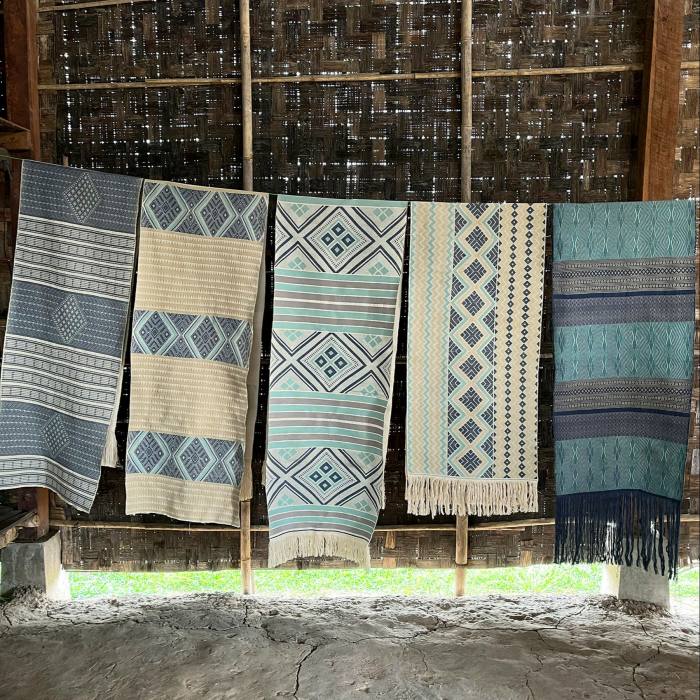
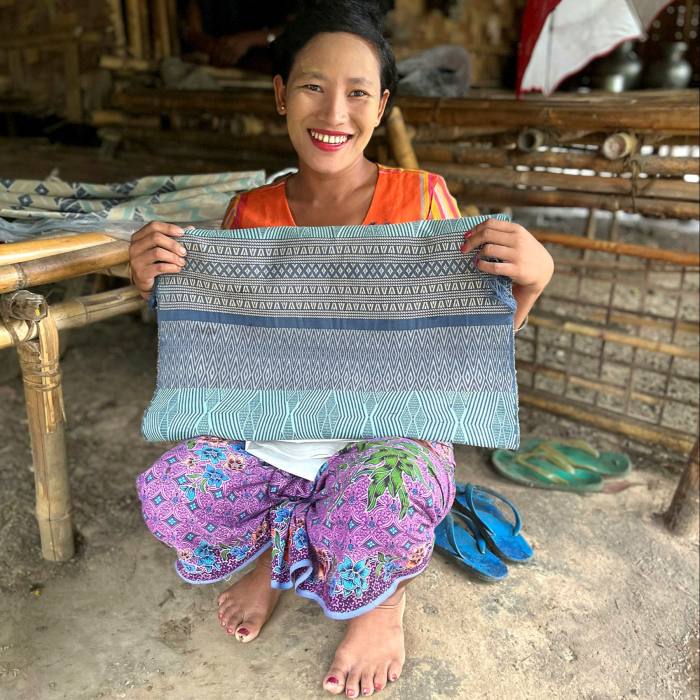
Kalinko is a commercial enterprise and needs to turn a profit. However, being conscious of the potential vulnerability of refugees to exploitation, Garnier (who has a full-time administrative staff of nine) places emphasis on treating her suppliers fairly. In addition to a comprehensive training programme, makers are paid $45 a piece. Garnier estimates that a weaving — which will retail for £90 — takes an average of a week to complete, earning each weaver more than twice the national minimum wage of 4,800 kyats, or $2.60 a day.
Based in cities, refugee camps and volatile regions like Afghanistan, workshops such as Kalinko’s offer employment while conserving techniques including embroidery and glass-blowing that might be lost during upheaval.
There are human benefits too: security, renewed morale and a sense of purpose, says Meherunnisa Asad, creative director of Studio Lél in Peshawar in northern Pakistan. The workshop opened 30 years ago to employ Afghan refugees skilled in pietra dura, or parchin kari — a technique of inlaid stonework dating back to the Roman period — fleeing the Soviet invasion of Afghanistan in late 1979. The studio has continued to welcome refugees — including those escaping the Taliban insurgency.
“When refugees cross borders they bring intangible and tangible parts of their culture with them. We wanted to keep that alive by offering them a safe place to work in,” says Asad, an architect by training who has previously worked on conservation projects for the Aga Khan Foundation.
Asad’s mother Farhana founded the enterprise after coming across a marble box in a market. She tracked down its Afghan maker and persuaded him to teach her the technique in her garage at home. In a “conservative, patriarchal society,” says Asad, her mother could never have been allowed to learn alongside male students, or visited a marble factory on her own.
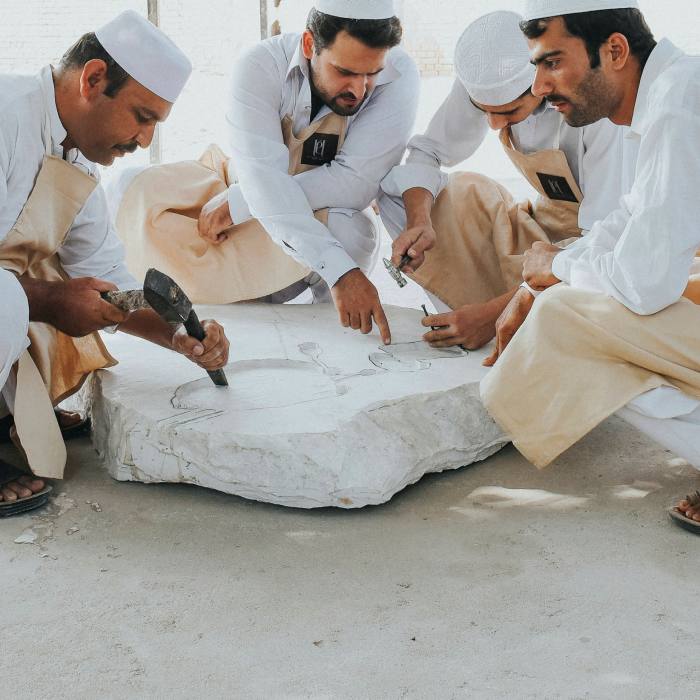
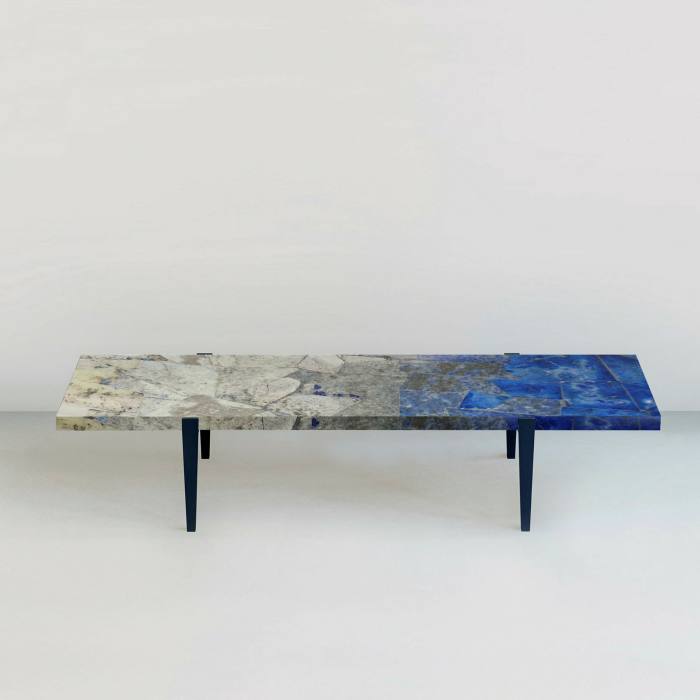
Lél has operated ever since, even during the Taliban insurgency, when bomb blasts would rattle the studio windows. “We all lost a relative during that time. But making became part of the healing mechanism,” she says. Crafts, she adds, “have the power to reconstruct identity”.
Its master craftsmen have trained a new generation of Pashtun locals, including women. They work alongside metal and woodworkers on furniture and panels for architects and designers.
Asad encourages makers to incorporate different techniques such as French verre églomisé glass gilding or Chinese cloisonné enamelling. Some new works reference Old Masters and Mughal miniatures. A “zero waste” collection of offcut material suspended in resin makes creative use of studio offcuts.
“High-end craft from Pakistan doesn’t have an international presence, I want to change that,” says Asad, who has also curated a collection of local design for Adorno, an online gallery for emerging makers.
In 2019, a grant from Karandaaz Pakistan (part of the Bill & Melinda Gates Foundation) funded research and training. This June, Lél became the first Pakistani collective to show at design fair Salone del Mobile, in Milan.
Liz Warner, a former commissioning editor for Channel 4, set up online store Different Kind to sell goods with a “positive impact”. “I think buyers are beginning to care more about who made a product, and in what circumstances,” she says. It’s no longer “old-fashioned sympathy shopping which used to mean compromising on style,” Warner adds. “These are luxuries that can also give a livelihood, and purpose.”
Another project, Love Welcomes, offers craft training to female refugees at a workshop in Greenwich, London. Through collaborations with fashion brands Levi’s and Joseph — “we think big”, says founder Abi Hewitt — the 19 employees have learnt skills like weaving and quilting. Textile artist Margo Selby, whose projects include commissions for the London Transport Museum and London’s Royal Opera House, has led workshops “to finesse techniques”. The women, from countries such as Ukraine, Sudan and Afghanistan, earn above the London Living Wage for the designs, which are sold online.
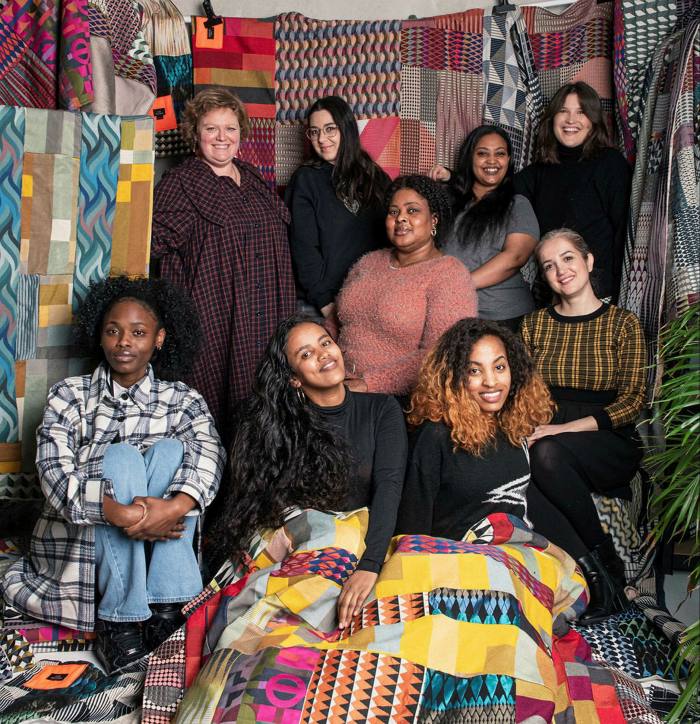
Refugee Angie Lansiquot, who was previously unemployed, joined the team last year working on mats, tea towels and other homewares. “I now earn enough to live on and send money to relatives,” she says. “Being in a team — with similar shared experiences — has been good for my mental health. Learning is part of that. It’s also given me the confidence to set up my own business.”
According to statistics from UNHCR, as of mid-2021 there were 135,912 refugees, 83,489 pending asylum cases and 3,968 stateless persons in the UK. Refugees have the right to work. Those seeking asylum do not.
At Love Welcome, employees also receive lessons in English, finance and IT. “It’s become a real source of support — and community — for people who’ve had no back-up before. I see the benefits every day,” says Hewitt. “Some may not have worked for years. We find people through other refugee organisations; it doesn’t take long. What they don’t want are favours. We’re about learning, and helping people to integrate.”
This is vital, says Fahira Mulamehic, employment programmes manager at the Refugee Council in London. “Refugees face so many hurdles in accessing work; not least cultural differences. Language is the most obvious. But recruitment processes also differ across the world.” Mulamehic, who works with organisations such as Ikea and PwC to help refugees enter the workplace, cites etiquette around eye contact as an example of something that varies between cultures.
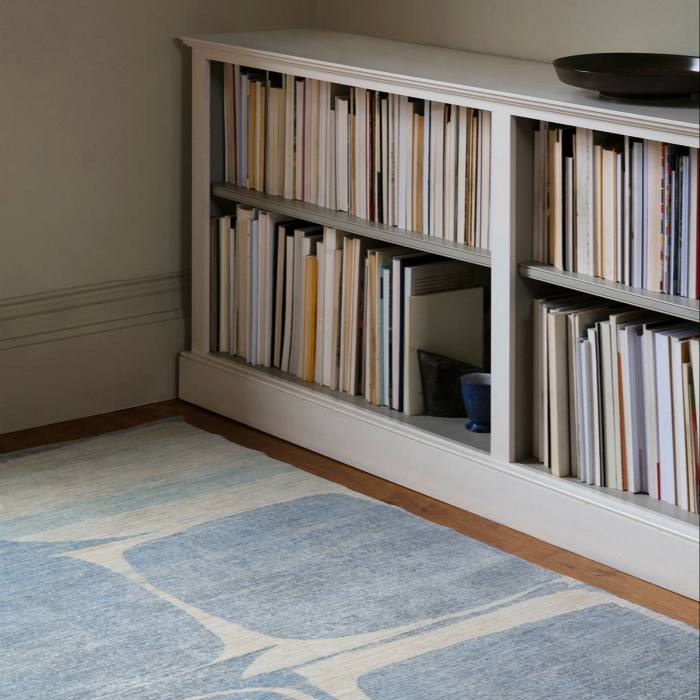
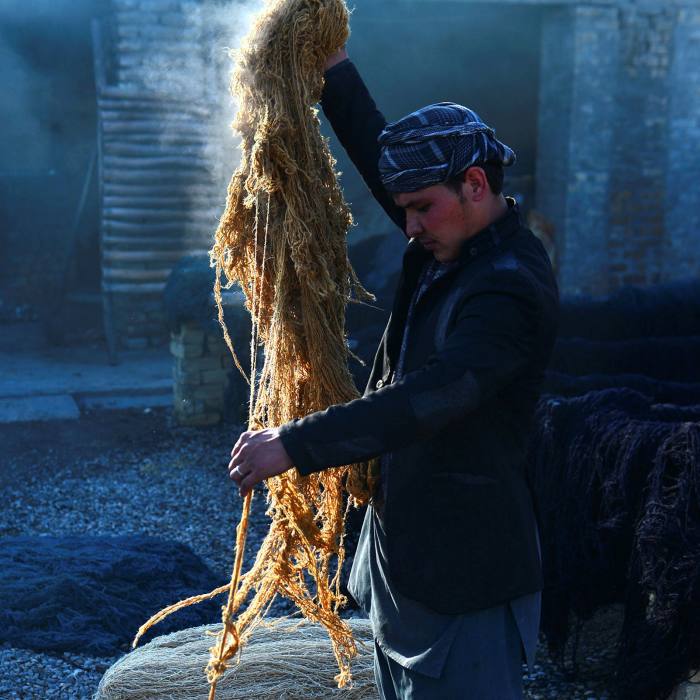
For Edmund Le Brun, craft offers us a tangible connection with other cultures, helping to dispel misconceptions. He founded Ishkar with his wife Flore de Taisne in 2016 to work with displaced artisans in Afghanistan.
“It was born out the feeling that the world has a narrow understanding of countries we read about in headlines. A country can suffer from conflict and corruption, but it can also be a place of extraordinary beauty and culture,” says Le Brun, who lived in Kabul from 2013 to 2016. “We wanted to build a brand that would embody that more complicated story.”
Ishkar verifies that prices and working conditions are fair in consultation with organisations such as the Norwegian Refugee Council and Label Step, a fair-trade non-profit organisation in the carpet industry. They had to put trading on hold when the Taliban regained control but resumed a few months ago.
Everything is done via WhatsApp. “The situation is difficult,” Le Brun says, “but it’s made us more determined to continue. Without continuing to support Afghanistan’s artisans we risk the destruction of one of the few viable livelihoods for women, and its heritage.”
He knows this might be viewed as controversial. “Through trade, some money will inevitably go to the Taliban. But the only taxes they are collecting are export tax. This is roughly 2 per cent of the value of the goods. For the customer, this equates to roughly 0.6 per cent of the retail price. It’s unpalatable, but the alternative of turning our backs on our partners is worse.”
Ishkar works with around 30 weavers producing kilims, their traditional motifs. Past collaborations include projects with Frank Gehry and Zaha Hadid. Edmund’s father, Christopher Le Brun, an artist and former president of London’s Royal Society of Arts, recently designed a range of hand-knotted rugs in abstract designs.
“About 50 per cent of purchases in the last year have been from repeat customers,” Le Brun says. “They’re very involved. We get emails every day asking about our makers. We can share concrete stories about what is happening on the ground through the individuals we are working with.”
Cultural ties also inspired Claudia Martinez Mansell to set up Kissweh in 2017. Based in a Palestinian refugee camp in south Lebanon, the studio specialises in traditional Palestinian embroidery with a modern edge. Martinez Mansell came across the technique while volunteering in a camp.
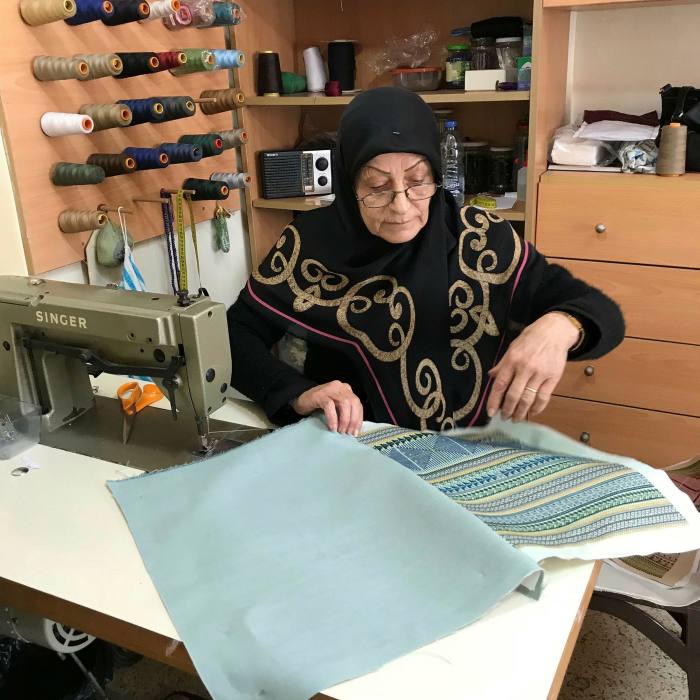
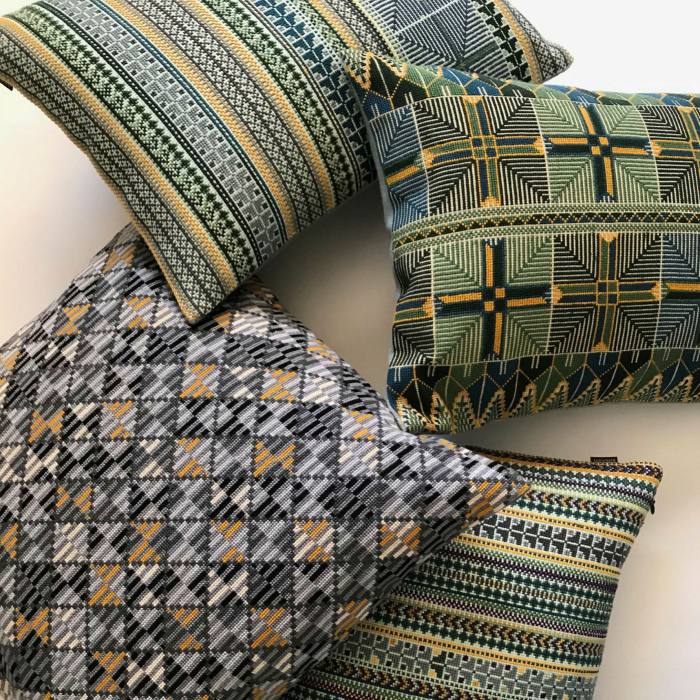
Kissweh employs 30 female needleworkers, who work full- and part time. “In Lebanon, refugees are only allowed to work in informal sectors such as cleaning, or food picking. So this is a chance to use their skills,” says Martinez Mansell, who now works for the UN. “Grandmothers have passed the technique down to daughters and grandchildren. It’s a lively art.”
Stitchers are paid per cushion on top of a basic wage. The vibrant cushions, made from Belgian linen, are signed and each one is different.
Martinez Mansell runs Kissweh with a local NGO. “They pay what is the going rate in the camps for the embroidery,” she says. “From my side, all the profits that Kissweh makes I share with the women — in dollars as the economy in Lebanon is terrible. I keep nothing. So we work as a co-operative.”
During 2020, online sales surged by 30 per cent as locked-down homeowners feathered their nests. The profits were divided among the team. Commissions from designers — such as Sibyl Colefax & John Fowler or Reath Design studio in the US — are a constant. “Once people buy, they come back,” Martinez Mansell says.
Kissweh has become a support system: “We share news: about children; life in the camp.” But what gives the most “tangible sense of satisfaction”, she says, is seeing these traditional crafts installed in appreciative new homes.
Find out about our latest stories first — follow @FTProperty on Twitter or @ft_houseandhome on Instagram
FT Weekend Festival, London
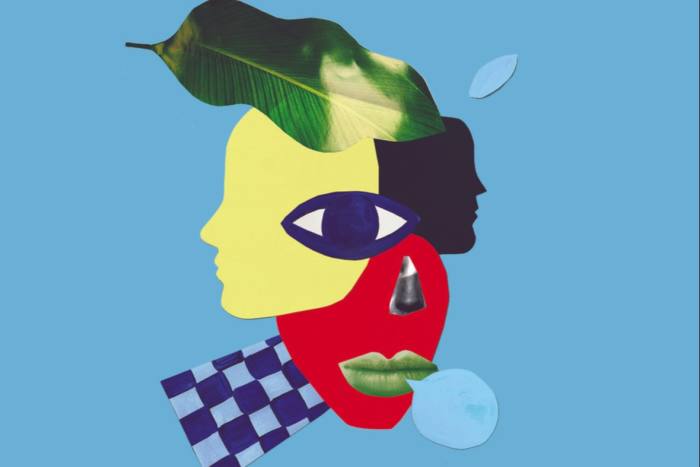
Save the date for Saturday, September 3 to listen to House & Home editor Nathan Brooker, gardens columnist Robin Lane Fox and more than 100 authors, property experts and artists at Kenwood House Gardens, London. Choose from 10 tents packed with ideas and an array of perspectives, featuring everything from debates to tastings, performances and more. Book your pass at ft.com/ftwf
Stay connected with us on social media platform for instant update click here to join our Twitter, & Facebook
We are now on Telegram. Click here to join our channel (@TechiUpdate) and stay updated with the latest Technology headlines.
For all the latest Art-Culture News Click Here
